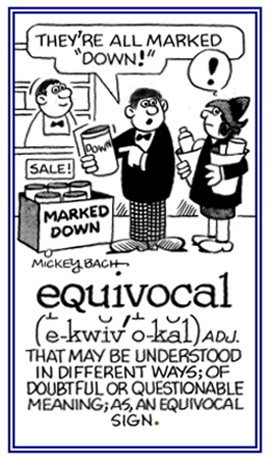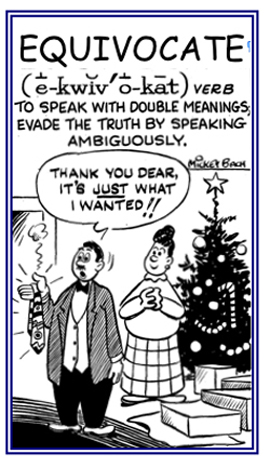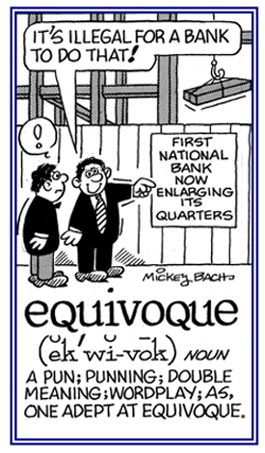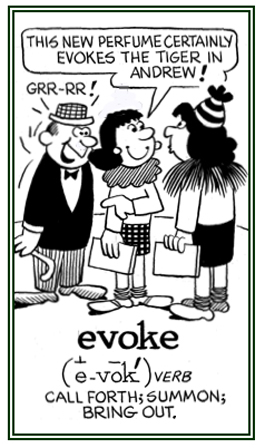voc-, voca-, vocab-, vocat-, -vocation, -vocative, -vocable, vok-, -voke
(Latin: call, talk, speak, say, voice; word)
equivocal (adjective), more equivocal, most equivocal
1. Regarding statements open to two or more interpretations; of uncertain nature or significance; often intended to mislead others: Bob’s mother gave him an equivocal, or ambiguous, answer to his question about having another piece of cake, so he decided for himself and took one more piece!
2. Open to more than one interpretation, especially when something is being deliberately expressed in a confusing way in an attempt to fool someone: The politician made an equivocal reply to a difficult question from a delegate at the meeting.
3. Concerning the difficulty to interpret, to understand, or to respond to: Anita's position on the issue presented by her supervisor is equivocal and nobody knows how she is likely to react to the accusation.
4. Pertaining to doubts and suspicions, especially about someone's honesty or sincerity: The new employee has served in prison and so his new supervisor has equivocal thoughts regarding his trustworthiness.

© ALL rights are reserved.
Go to this Word A Day Revisited Index
2. Open to more than one interpretation, especially when something is being deliberately expressed in a confusing way in an attempt to fool someone: The politician made an equivocal reply to a difficult question from a delegate at the meeting.
3. Concerning the difficulty to interpret, to understand, or to respond to: Anita's position on the issue presented by her supervisor is equivocal and nobody knows how she is likely to react to the accusation.
4. Pertaining to doubts and suspicions, especially about someone's honesty or sincerity: The new employee has served in prison and so his new supervisor has equivocal thoughts regarding his trustworthiness.

Go to this Word A Day Revisited Index
so you can see more of Mickey Bach's cartoons.
equivocally (adverb), more equivocally, most equivocally
Characterized by having two or more interpretations and usually used to mislead or to confuse someone or even a number of people.
1. A position or statement lacking clarity by virtue of having more than one meaning: Steven was known for his equivocalness because his answers could be interpreted this way or that way.
2. Being ambiguous, doubtful, dubious, indefinite, obscure, suspicious, and uncertain; such as, being naturally understood in one way, but it is also easily capable of having a different interpretation: Jack was quite unpredictable in stating exactly what he would like to do, and this equivocalness made it difficult for his friends to know what he wanted to do or not want to do when planning a trip for the weekend.
2. Being ambiguous, doubtful, dubious, indefinite, obscure, suspicious, and uncertain; such as, being naturally understood in one way, but it is also easily capable of having a different interpretation: Jack was quite unpredictable in stating exactly what he would like to do, and this equivocalness made it difficult for his friends to know what he wanted to do or not want to do when planning a trip for the weekend.
equivocate (verb), equivocates; equivocated; equivocating
1. To be deliberately ambiguous, or unclear, in order to mislead or to withhold information: The applicant for the job seemed to be equivocating when he was asked why he was leaving his current job and wanting to work with this other company.
2. To speak vaguely; especially, in order to avoid a commitment or to fool other people: The judge warned the witness at the beginning of her testimony not to equivocate when the attorney asked her for details about the crime that she saw taking place at the bank.

© ALL rights are reserved.
Go to this Word A Day Revisited Index
2. To speak vaguely; especially, in order to avoid a commitment or to fool other people: The judge warned the witness at the beginning of her testimony not to equivocate when the attorney asked her for details about the crime that she saw taking place at the bank.

Go to this Word A Day Revisited Index
so you can see more of Mickey Bach's cartoons.
1. Falsification by means of vague language: Lawyers always advise people not to use equivocations in their wills, but to be specific in what they want done.
2. An assertion that is not exactly wrong, but evades a disagreeable truth: The club’s president made an equivocation when he said that they could use a bit more money, when in fact they were deep in debt!
3. In logic, the two-fold meaning of a term which then creates a fallacy: Willfully distorting the facts can also be called an equivocation, when stating that someone took the keys to the car when, in fact, the driver was the one who did it!
2. An assertion that is not exactly wrong, but evades a disagreeable truth: The club’s president made an equivocation when he said that they could use a bit more money, when in fact they were deep in debt!
3. In logic, the two-fold meaning of a term which then creates a fallacy: Willfully distorting the facts can also be called an equivocation, when stating that someone took the keys to the car when, in fact, the driver was the one who did it!
1. A respondent who avoids giving a clear or direct answer: James, as an equivocator, was evading his mother’s questions about his homework when he said that he would be done in a minute, when, in fact, he hadn’t even started doing it!
2. Anyone who prevaricates or hedges when responding to a question: When asked directly for the politician's position on disarmament, he was a master equivocator and so he avoided presenting an honest response.
2. Anyone who prevaricates or hedges when responding to a question: When asked directly for the politician's position on disarmament, he was a master equivocator and so he avoided presenting an honest response.
1. A statement that is susceptible to different interpretations because it is vague or unclear: The equivoque that Shirley made left the others quite up in the air and they were not sure what she meant and so the problem was still unresolved.
2. A play on words, a double meaning, or an evasion of a point in an argument by raising irrelevant distinctions or objections: Nancy was the only one with an equivoke when the family was discussing the objectives in the upcoming vacation saying she didn’t want to go to Paris because it might rain!

© ALL rights are reserved.
Go to this Word A Day Revisited Index
2. A play on words, a double meaning, or an evasion of a point in an argument by raising irrelevant distinctions or objections: Nancy was the only one with an equivoke when the family was discussing the objectives in the upcoming vacation saying she didn’t want to go to Paris because it might rain!

Go to this Word A Day Revisited Index
so you can see more of Mickey Bach's cartoons.
evocable (adjective), more evocable, most evocable
1. Pertaining to something which can be brought to mind, such as a memory or feeling, especially from the past: Herald's evocable childhood recollections were intensified when he looked at the family's picture album.
2. A reference to a situation that can cause a reaction or a special feeling about something or someone: Traveling through the Mojave Desert was quite evocable because Ginny remembered quite well the times when she camped out there with her family when she was a child.
2. A reference to a situation that can cause a reaction or a special feeling about something or someone: Traveling through the Mojave Desert was quite evocable because Ginny remembered quite well the times when she camped out there with her family when she was a child.
1. A stimulation that causes a particular kind of behavior: The evocation caused by the roast in the oven made Karen's children want to eat dinner as soon as possible!
2. A re-creation of something not present; especially, an event or feeling from the past: Evocations were present in the Jone's family at Christmas time when they all got together and were around the Christmas tree, singing Christmas carols like they did when they were little children.
3. The calling up of supernatural forces by spells and incantations: Evocations are used sometimes when spirits or demons are summoned by a spiritualist.
2. A re-creation of something not present; especially, an event or feeling from the past: Evocations were present in the Jone's family at Christmas time when they all got together and were around the Christmas tree, singing Christmas carols like they did when they were little children.
3. The calling up of supernatural forces by spells and incantations: Evocations are used sometimes when spirits or demons are summoned by a spiritualist.
evocative (adjective), more evocative, most evocative
1. Prompting vivid memories, or images, of things not present; especially, things from the past: Mary's mother often baked cookies when she was a child; so, now whenever she smells cookies being baked, she has evocative memories of her childhood.
2. Referring to something which brings someone or something to mind: Smelling the perfume was very evocative of spring flowers in bloom.Serving to bring someone, or something, to mind.
2. Referring to something which brings someone or something to mind: Smelling the perfume was very evocative of spring flowers in bloom.Serving to bring someone, or something, to mind.
evoke (verb), evokes; evoked; evoking
1. To produce memories, emotions, responses, feelings, etc.: While Jeff was looking again at the old family home, it evoked many pleasant recollections of the times when he was living there.
2. To suggest, through artistry and imagination, a vivid impression of some kind of reality: Reading the Harry Potter books certainly evokes many sensations of being right there in the story where the action is taking place!
3. To call forth or to bring out in a strong way: The politician's statement that he was strongly in favor of a reduction in taxes evoked strong applause and cheers from his political supporters.

© ALL rights are reserved.
Go to this Word A Day Revisited Index
2. To suggest, through artistry and imagination, a vivid impression of some kind of reality: Reading the Harry Potter books certainly evokes many sensations of being right there in the story where the action is taking place!
3. To call forth or to bring out in a strong way: The politician's statement that he was strongly in favor of a reduction in taxes evoked strong applause and cheers from his political supporters.

Go to this Word A Day Revisited Index
so you can see more of Mickey Bach's cartoons.
A person who or something which can produce or inspire a memory or some kind of feeling that has taken place before: Planting irises in her garden seemed to be evokers of Jan's favorite flowers which her father he had planted in his garden.
intervocalic (adjective), more intervocalic, most intervocalic
A description of a speech sound that occurs, or is inserted, between vowels; for example, between one word that ends with a vowel and another word that starts with a vowel: Some intervocalic sounds can be found in such words as "metal" and "batter"; the consonant in the term "metal" is a "t" placed between the two vowels "e" and "a", and so the "t" sounds like a "d"; in "batter", the letter "t" appears twice and is between the vowels "a" and "e" and, when pronounced, sound like "badder".
1. A calling upon a greater power; such as, God or a Holy Spirit for help: In church, during the invocation, the pastor prayed to the Holy Father for His aid and protection of the people in Africa.
2. A form of prayer pleading for God's presence; especially, one said at the beginning of a religious service or public ceremony: When the church service started, the invocation included an earnest plea for the the Holy Spirit to bring them His guidance and help during these troublesome times.
3. The act of calling upon or quoting something; such as, a law as a reason or justification for doing something: As an invocation to support her wish, Sally repeated what her mother had said for moral support, and which she stated to her father: "But Mom said I could stay out with my friends until ten o'clock."
4. A casting of a spell in an attempt to make an evil spirit appear: In a fairy tale that Jimmy was reading, a witch used invocations and recited magical words to summon supernatural powers to put the princess to sleep for 100 years.
2. A form of prayer pleading for God's presence; especially, one said at the beginning of a religious service or public ceremony: When the church service started, the invocation included an earnest plea for the the Holy Spirit to bring them His guidance and help during these troublesome times.
3. The act of calling upon or quoting something; such as, a law as a reason or justification for doing something: As an invocation to support her wish, Sally repeated what her mother had said for moral support, and which she stated to her father: "But Mom said I could stay out with my friends until ten o'clock."
4. A casting of a spell in an attempt to make an evil spirit appear: In a fairy tale that Jimmy was reading, a witch used invocations and recited magical words to summon supernatural powers to put the princess to sleep for 100 years.
invoke (verb), invokes; invoked; invoking
1. To earnestly request something from someone; such as, to ask for aid or protection: Susan invoked her brother’s help for assistance in changing the tires on her car.
2. To quote, to rely on, or to use something; such as, a law in support of an argument or case: The chairman of the committee invoked the principle of helping and protecting the refugees in their town as much as possible.
3. To create, or to arouse, an idea, emotion, or image: Some music by Beethoven evokes the feeling of being in a wide open field or meadow.
4. To call upon an evil spirit to appear; such as, by casting a spell: In the children's story, the old hag invoked magical words which turned the prince into a frog!
2. To quote, to rely on, or to use something; such as, a law in support of an argument or case: The chairman of the committee invoked the principle of helping and protecting the refugees in their town as much as possible.
3. To create, or to arouse, an idea, emotion, or image: Some music by Beethoven evokes the feeling of being in a wide open field or meadow.
4. To call upon an evil spirit to appear; such as, by casting a spell: In the children's story, the old hag invoked magical words which turned the prince into a frog!
Cross references of word families related directly, or indirectly, to: "talk, speak, speech; words, language; tongue, etc.":
cit-;
clam-;
dic-;
fa-;
-farious;
glosso-;
glotto-;
lalo-;
linguo-;
locu-;
logo-;
loqu-;
mythico-;
-ology;
ora-;
-phasia;
-phemia;
phon-;
phras-;
Quotes: Language,Part 1;
Quotes: Language, Part 2;
Quotes: Language, Part 3;
serm-;
tongue.


